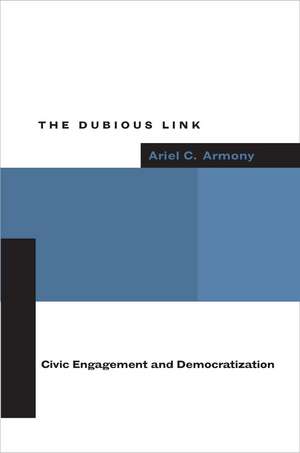The Dubious Link: Civic Engagement and Democratization
Autor Ariel Armonyen Limba Engleză Hardback – iun 2004
It is often argued that civic activity, such as the participation of average citizens in voluntary associations, benefits all democracies. But sometimes the involvement of citizens contributes to the collapse of democracy, the exclusion of minorities, and the deepening of society's fragmentation. This book challenges the idea of a positive, universal connection between civil society and democracy, and argues that the specific context in which people organize shapes the character of civil society.
The Dubious Link examines the "dark side" of civil society—the cases in which the participation of average citizens leads to undemocratic results. Combining a variety of research methods, Ariel Armony looks at the vital sphere of associational life in pre-Nazi Germany, anti-desegregation movements in the United States, and new organizations for human and civil rights in democratic Argentina. The book concludes with a statistical analysis of the impact of civil society on a set of contemporary democracies.
The Dubious Link examines the "dark side" of civil society—the cases in which the participation of average citizens leads to undemocratic results. Combining a variety of research methods, Ariel Armony looks at the vital sphere of associational life in pre-Nazi Germany, anti-desegregation movements in the United States, and new organizations for human and civil rights in democratic Argentina. The book concludes with a statistical analysis of the impact of civil society on a set of contemporary democracies.
Preț: 505.58 lei
Preț vechi: 624.17 lei
-19% Nou
Puncte Express: 758
Preț estimativ în valută:
96.74€ • 101.28$ • 80.05£
96.74€ • 101.28$ • 80.05£
Carte tipărită la comandă
Livrare economică 05-19 aprilie
Preluare comenzi: 021 569.72.76
Specificații
ISBN-13: 9780804748988
ISBN-10: 0804748985
Pagini: 312
Dimensiuni: 152 x 229 x 25 mm
Greutate: 0.54 kg
Ediția:1
Editura: Stanford University Press
Colecția Stanford University Press
ISBN-10: 0804748985
Pagini: 312
Dimensiuni: 152 x 229 x 25 mm
Greutate: 0.54 kg
Ediția:1
Editura: Stanford University Press
Colecția Stanford University Press
Recenzii
"This book is a critical advancement of our understanding of civil society's role in the state-society relations of modern democracy. With its clear structure and in-depth case studies, it is an invaluable contribution to political science, sociology, legal studies, and Latin American studies."
—Mark Ungar, Brooklyn College, The City University of New York
—Mark Ungar, Brooklyn College, The City University of New York
"The question of whether and how civil society influences democracy is one of the central questions of our times. Ariel Armony presents an excellent, interesting, and important book that will be a great contribution to the central debates in the field."—Alison Brysk, University of California, Irvine
Notă biografică
Ariel C. Armony is assistant professor of government at Colby College. He is the author of Argentina, the United States, and the Anti-Communist Crusade in Central America, 1977-1984 and coeditor of Repression, Resistance, and Democratic Transition in Central America.
Textul de pe ultima copertă
“This book is a critical advancement of our understanding of civil society's role in the state-society relations of modern democracy. With its clear structure and in-depth case studies, it is an invaluable contribution to political science, sociology, legal studies, and Latin American studies.”
—Mark Ungar, Brooklyn College, The City University of New York
“The question of whether and how civil society influences democracy is one of the central questions of our times. Ariel Armony presents an excellent, interesting, and important book that will be a great contribution to the central debates in the field.”—Alison Brysk, University of California, Irvine
—Mark Ungar, Brooklyn College, The City University of New York
“The question of whether and how civil society influences democracy is one of the central questions of our times. Ariel Armony presents an excellent, interesting, and important book that will be a great contribution to the central debates in the field.”—Alison Brysk, University of California, Irvine
